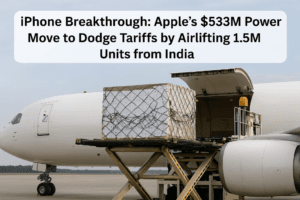iPhone Breakthrough: Apple’s $533M Power Move to Dodge Tariffs by Airlifting 1.5M Units from India
In a strategic pivot, Apple airlifted 1.5 million iPhones from India to the U.S. via chartered cargo flights, circumventing steep tariffs imposed on Chinese imports under former President Donald Trump’s trade policies. With China facing a 125% tariff compared to India’s 26%, Apple accelerated production at Foxconn’s Chennai plant—operating seven days a week—to build inventory ahead of potential price hikes.
India’s government fast-tracked customs clearances, slashing wait times from 30 hours to six, while incentives like production-linked subsidies bolstered local manufacturing. This shift underscores Apple’s broader “China+1” strategy to diversify supply chains amid geopolitical tensions. India aims to produce 25% of global iPhones by 2025, positioning itself as a critical tech hub.
For consumers, the move may stabilize U.S. prices temporarily, but long-term success hinges on India’s capacity to scale quality output—a milestone reshaping global trade dynamics and corporate reliance on Chinese manufacturing.

iPhone Breakthrough: Apple’s $533M Power Move to Dodge Tariffs by Airlifting 1.5M Units from India
In a bold maneuver to sidestep escalating U.S. tariffs on Chinese imports, Apple has airlifted 1.5 million iPhones from India to the U.S., marking a pivotal shift in its global supply chain strategy. This move underscores the tech giant’s urgent efforts to diversify production beyond China amid rising trade tensions and geopolitical uncertainties.
The Tariff Tightrope: Why Apple Made the Shift
The urgency stems from former President Donald Trump’s reinstated tariffs, which impose a steep 125% levy on Chinese imports compared to 26% for Indian goods. While a 90-day tariff pause temporarily exempts some countries, China remains excluded, forcing Apple to accelerate its decade-long “China+1” diversification strategy. By ramping up production in India—where Foxconn’s Chennai plant reportedly operated seven days a week to meet demand—Apple aims to mitigate cost hikes that could inflate U.S. iPhone prices by 15–20%, according to analysts.
India’s Rising Role in Global Tech Manufacturing
India’s emergence as a manufacturing hub is no accident. Prime Minister Narendra Modi’s government has aggressively courted tech giants through initiatives like the Production-Linked Incentive (PLI) scheme, offering subsidies to boost local production. Apple’s lobbying efforts also secured faster customs clearances at Chennai’s airport, slashing wait times from 30 hours to six. These measures align with India’s ambition to capture 25% of global iPhone production by 2025, up from 7% in 2023.
Key Numbers
- 20 million iPhones produced in India in 2024.
- $533 million saved annually by shifting 20% of U.S.-bound production from China to India.
Geopolitical Chess: Beyond Tariffs
Apple’s pivot reflects broader corporate strategies to reduce reliance on China amid U.S.-China trade wars and supply chain vulnerabilities exposed during the pandemic. Companies like Samsung and Google have similarly expanded to Vietnam and Mexico, but India’s scale and policy incentives make it a standout. However, challenges persist: infrastructure gaps, complex labor laws, and skill shortages could hinder rapid scaling.
Consumer Impact: Will iPhone Prices Stay Stable?
By bypassing Chinese tariffs, Apple may cushion U.S. consumers from price spikes—for now. Yet, long-term stability hinges on India’s capacity to meet quality and volume demands. If successful, this shift could pressure rivals to follow suit, reshaping global tech manufacturing.
The Road Ahead
While Apple’s move is tactically sound, it highlights the fragility of global trade systems. As Trump’s tariffs redefine supply chains, India’s success in becoming a viable alternative will depend on sustained policy support and infrastructure investment. For consumers, the hope is that diversification keeps devices affordable without compromising innovation.
In essence, Apple’s airlifted iPhones symbolize more than a tariff dodge—they’re a bellwether for a new era of decentralized, politically agile supply chains. As trade policies evolve, adaptability may become the ultimate competitive edge.
You must be logged in to post a comment.